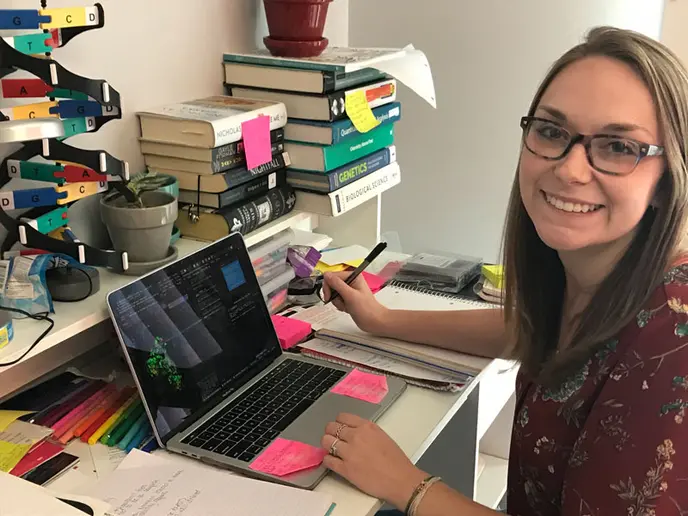

Kelsey Wolfe, at her home computer, where she conducted summer research for a project hosted by Rutgers University.
Accepted Students ONLY!
Join us Saturday, March 28 (10 AM–2 PM) for Go Big BLUE DAY — sessions, tours, and giveaways.
Sign Up Today!


Kelsey Wolfe, at her home computer, where she conducted summer research for a project hosted by Rutgers University.
Kelsey Wolfe, a junior Biochemistry major, gained valuable research experience in the Center for Advanced Biotechnology Medicine (CABM) Summer Undergraduate Research Experience (SURE) program hosted by Rutgers University.
The 2018 Frewsburg High School graduate spent nine weeks working on a NASA Astrobiology Institute project, Evolution of Nanomachines in the Geosphere and Microbial Ancestors (ENIGMA). Its goal was to understand the structure and function of the first proteins that started life on Earth some 3.8 billion years ago.
Wolfe, one of nine undergraduates in the SURE research program held virtually during a nine-week period, examined the evolution of proteins using computational biology. Due to COVID-19 restrictions, she worked from home on a computer using technologies, such as Zoom, to collaborate with Professor of Biochemistry and Molecular Biology Vikas Nanda of the Robert Wood Johnson Medical School at Rutgers, and mentors.
Fredonia Department of Biology Assistant Professor Nicholas Quintyne, a graduate school colleague of Dr. Nanda, helped facilitate Wolfe’s participation in the research project.
Wolfe was tasked with taking a set of proposed primordial building blocks the lab had identified and classifying them using established systematics for modern proteins. “Put another way, if you could imagine a tree of life based on proteins, rather than organisms, Kelsey's job was to figure out where on the tree the earliest proteins would be found,” explained Nanda, the project investigator.
Wolfe wrote software that compared two lists: one of ancient proteins and the other of modern proteins, and combined the two together. She worked on writing scripts with Python, a computer programming language, to create algorithms that sorted and merged two large data sets (over 700,000 rows in Excel) based on a common key ID.
“With those completed, I could begin preliminary analysis of the details within the unique data set to determine 3D structures of different proteins. Each protein has a four-digit ID that corresponds to its structure. Other details were provided about the 3D structure of the proteins, and that information could help determine the ancient structures of proteins at the start of life on earth,” Wolfe explained.
“Given that Kelsey had minimal computer programming experience prior to the summer, she did a fantastic job of learning how to code in parallel with doing science,” Nanda observed.
Because the overall program was conducted virtually, Wolfe had to teach herself programming independently, with minimal instruction. By the end of the summer, she was writing sophisticated programs and made solid contributions to the project, Nanda said.
The experience gave Wolfe new exposure to computational research in biology.
“Being able to code or write in computer languages is so important for scientific processes,” Wolfe said. “With this new skill, I can learn to create prediction models for experiments, which could help accelerate the trial and error process of experimental work in a lab setting,” Wolfe explained.
“On an undergraduate level as well as a graduate school level, the knowledge I gained and the mentors I worked with can help build my scientific confidence as well as a network for future work in computational biology,” she added.
“On an undergraduate level as well as a graduate school level, the knowledge I gained and the mentors I worked with can help build my scientific confidence as well as a network for future work in computational biology.” - junior Biochemistry major Kelsey Wolfe
Wolfe said learning how to write scripts with Python while also learning different aspects of science that connected life as it’s known was the biggest takeaway of the summer research. Additionally, she said she was able to work with humble and experienced scientists as an undergraduate, creating relationships and connections that will help her advance her science education and pursue a career path.
Wolfe met virtually with four graduate student mentors and the other undergraduate SURE students every week to present progress and learn scientific communication skills.
In a separate project, Wolfe collaborated with other SURE students to put together a poster on COVID-19, integrating recent data in biochemistry, epidemiology and virology to propose new therapeutic interventions.
Nanda indicated Wolfe brought enthusiasm and professionalism to the program.
“I believe she learned a lot about scientific communication through presentations in the weekly SURE meetings, virtual meetings with me, and through the end of summer symposium and poster presentation. Furthermore, she has developed an interest in computer programming, which is an essential skill in many areas of study today.”
Data generated by Wolfe in her primary research work will be used to identify which genes are common to critical life processes such as metabolism and translation, Nanda said. “While there is still much to be done, at the conclusion of the current project, Kelsey will certainly be a co-author on the publication because of her intellectual contributions.”
NASA supports astrobiology research in order to inform future space exploration missions that seek to find life elsewhere and provided a five-year, $5.1 million grant to fund SURE research activities.